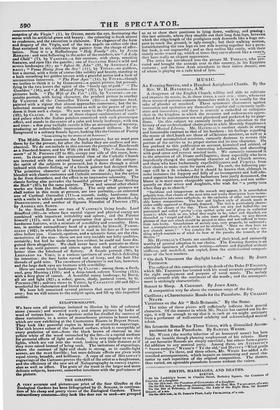MUSIC.
A clergyman of time English Church, willing and able to cultivate and improve its music, is, in these times, a rara avis ; since, whenever these reverend persons concern themselves with it, it is usually for the sake of plunder or mischief. These systematic clamourers against innovation and spoliation are themselves regular and systematic spoli- ators and innovators ; and there is scarcely a cathedral or collegiate choir in the kingdom in which the revenues and endowments appro- priated for its maintenance are not plundered and pocketed by its guar- dians. On this subject we earnestly invite public attention to the history of our ecclessiastical choirs given in elate Monthly Supplement to the Musical Library. Mr. HAVERGAL'S conduct stands in strong and honourable contrast to that of his brethren : his feelings regarding the music of the Church are those of aChristian minister, as well as a sound and accomplished musician, earnestly desirous to restore this portion of the service to its proper station and its true character. He has prefixed to this publication an account, historical and critical, of Chants and Chanting ; full of interesting information, and abounding with good sense and correct musical taste. We earnestly commend it to the attention of all Deans and Chapters; those especially who have impudently changed the antiphonal character of the Church service, and those who have barbarously expelledGmoNs and PURCELL from their choirs to make room for opera airs. To such, the following pas- sage will be a fit rebuke,—for it should be known that, although in some instances the foppery and folly of an incompetent and half-edu- cated organist has introduced the barbarisms here justly denounced, the blame is in most cases chargeable upon his superiors, and not unfre- quently on their wives and daughters, who wish for "a pretty tune when they go to church."
"Invidious and inopportune as the remark may appear, it is nevertheless palpably true, that chants of the most trite and trashy description have insinu- ated themselves into some cathedrals, to the exclusion of older and incompar- ably better compositions. The best and highest style of church music is either coldly approved or flippantly despised. The fact is particularly observ- able in the chants of the day. Those which are airy and ballad-like are patronized and called pretty'—(an epithet quite out of place in cathedral music); while such as are, what they ought to be, sober and dignified, are discarded as stupid and dull.' In even some good chants, we may discern phrases of that sort which should be pruned in time, and not suffered to luxu- riate into levity. Gracefulness of melody may, very properly, be cultivated ; but a transplantation of style must not be allowed. ' Must we then have no new church music ? " Yes (replies Dr. Crotch), but no new style ; no- thing which reminds us of what we hear at the parade, the concert, or the theatre.'" Mr. HAVERGAL'S Chants are excellent of their kind, and eminently worthy of general adoption in our choirs. The Evening Service is an admirable specimen of church writing—solemn and dignified without stiffness, and modelled, not copied, from the ecclesiastical composi- tions of the best masters.


























 Previous page
Previous page